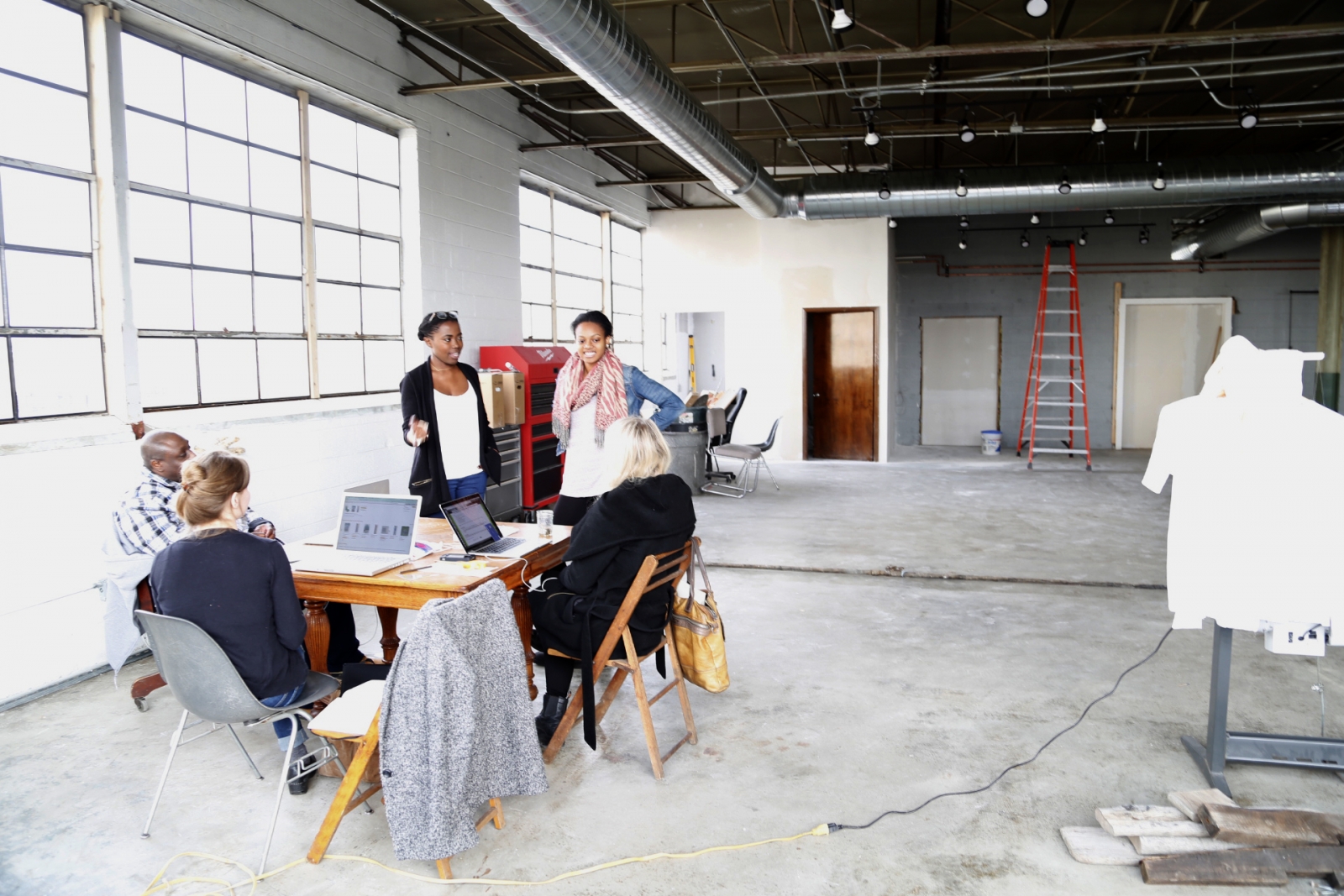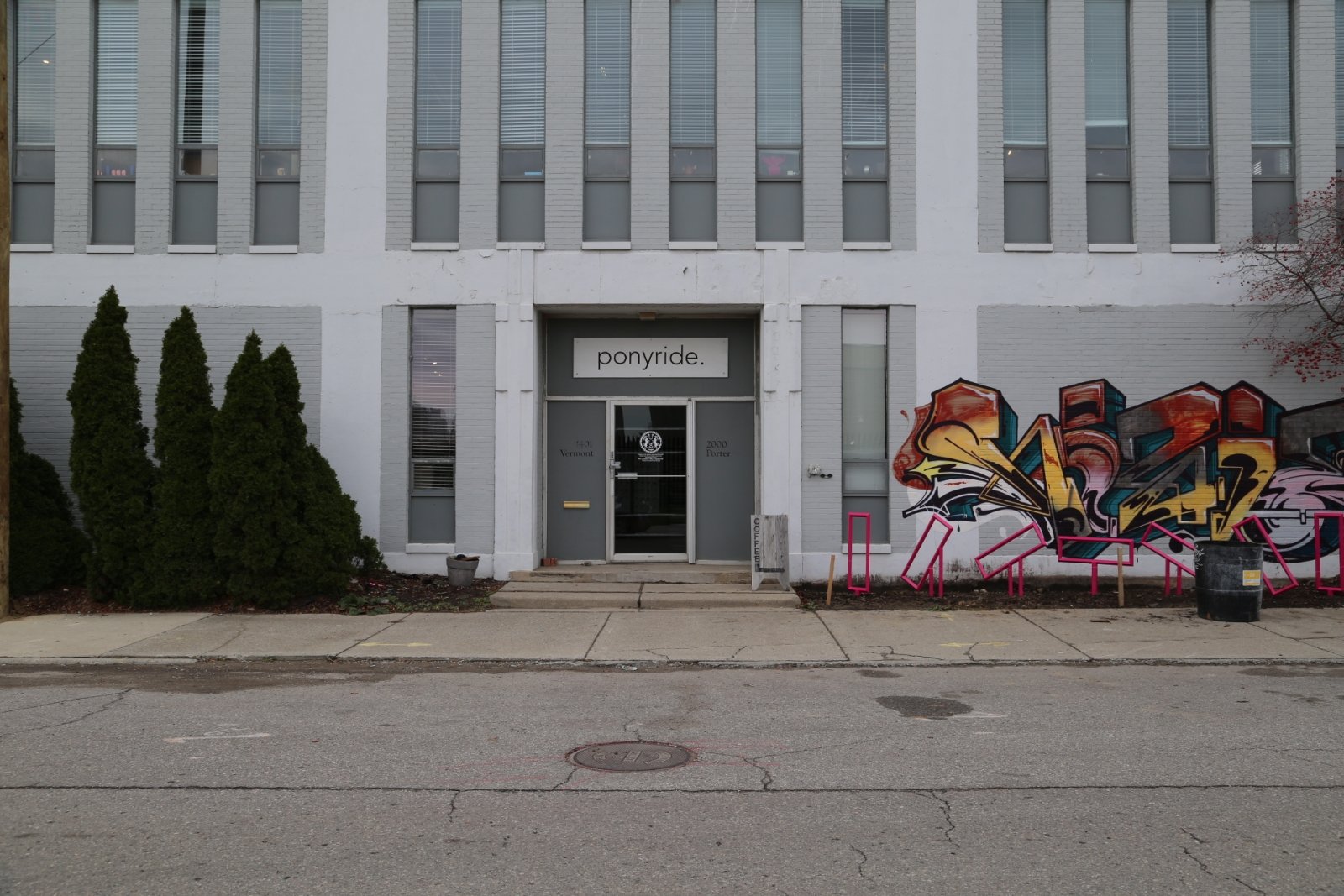
January 26, 2016
Game Changers 2016: Co-Working Space Ponyride Detroit
Many have pegged Detroit’s comeback to a rebirth of manufacturing. A collaborative working space shows the way forward by linking entrepreneurial making with urban growth.

Corktown, where Ponyride runs its collaborative working space in a rehabilitated building, is one of the oldest neighborhoods in Detroit, and is becoming one of the centers of the city’s creative renaissance.
Photography by Trisha Holt
“Don’t wash them for the first six months. Or the first year, if you can.” That’s the advice Eric Yelsma gives everyone who buys a pair of Detroit Denim jeans. Put them on, and it’s clear why. These jeans need breaking in, because they are made the old-fashioned way, each pair going through 85 steps—from American-made denim to no-nonsense pants—on the second floor of Ponyride, a collaborative working space in Detroit’s Corktown neighborhood. Phil Cooley, a cofounder of Ponyride, has been wearing his second pair for a few months now, while Yelsma is working on mending his first pair.
“In terms of a collective effort, there are a couple of studios in Detroit now that are starting to bring people together under one roof,” says Jane Schulak, founder of the local nonprofit Culture Lab Detroit, “but there’s nothing quite like Ponyride.” Indeed, it’s an injustice to simply call it a “collaborative working space.” Both coworking and maker spaces have mushroomed in cities all over the United States, as the economy bounces back from the Great Recession and young entrepreneurs grab the chance to make good on their skills and ideas. Even in this national scenario, Ponyride is a rare animal—partly because it combines aspects of coworking and making, but also just because it’s in Detroit, a city that is under immense pressure to “come back” or “reinvent itself,” depending on whom you ask.
Organizations like The Empowerment Plan, which provides clothing for homeless communities, and Detroit Soup, which raises awareness and funds for emerging social entrepreneurs, have shared office space in the building since Ponyride opened its doors. Another coworking space was added to this location in early 2014. Equally important to the building’s mission are the basement recording studio where Beehive Recording Company operates, the entry-level café run by Anthology Coffee, and the immense workshop space on the first floor where Line Studio casts concrete furniture and Smith Shop maintains a small but full-fledged forge. All these tenants pay highly subsidized rent for the space they use. In return, they donate time to run community workshops or teach courses at Ponyride or local schools, trying to spark a new generation of makers and build a can-do attitude among young Detroiters. This is what really glues this motley crew of metalsmiths, musicians, furniture makers, and do-gooders together: their vision for their city
“Ponyride is about whether something positive could come out of the foreclosure crisis,” Cooley says. A former fashion model and the son of real estate developers, the 37-year-old moved to Detroit in 2002; three years later, he opened Slows Bar BQ in Corktown, a restaurant that has often been credited with improving the city’s reputation, in culinary circles at least. It became the linchpin of Cooley’s relentless community building—after the recession hit, he had a finger in a number of civic-minded pies, and former mayor David Bing even appointed him the chairman of the city’s ambitious Detroit Works Project. Then a bank called him about a derelict property—would he like to purchase a 30,000-square-foot building in his neighborhood for $100,000?

Stella Safari (foreground) became executive director of the space last September. “My heart gravitated toward Ponyride,” she says. “I worked with a lot of tech companies and Ponyride was an opportunity to work with creative entrepreneurs.”
“I obviously knew that was a part of the foreclosure crisis, getting it that cheap, so I felt strange about the proposition,” Cooley says. “I didn’t want to be the only person to benefit from something that had a negative history.” He had been renting woodworking space in the city for nine years, so he needed a home for his workshop. And he knew plenty of other young makers and entrepreneurs in similar situations. “A lot of us just moved in, threw down mattresses in old offices, on really hideous carpet—it was pink at one time, but had become brown because of the stains.” Along with volunteers, that first group began the long task of making the building usable, floor by floor, stripping everything back to the basic structure and taking down the plywood boarding up the windows. It’s a process that has gone on for years—only a few months ago, there were still windows that had to be replaced.
“The space was activated without a particular plan,” Stella Safari, the executive director of Ponyride, says. “It was a really smart move on Phil’s behalf, to just provide the space and see what people do with it.” Safari comes from the world of venture funds, and about two years ago she started working with start-ups in Detroit, including the maker-entrepreneurs at Ponyride, before taking on her current role in September. “What we’ve seen is that there are amazing products and makers coming out of that space who also care about the future of Detroit,” she says. “How can we help them grow their businesses and be profitable but also have a positive impact on the city?”
Floyd, where Safari worked full-time for eight months before joining Cooley, is one example of the kind of journey Ponyriders have. The company was founded by Kyle Hoff and Alex O’Dell after a successful 2014 Kickstarter campaign to produce the Floyd Leg, a remarkable DIY solution that can be fixed onto any flat piece of material to turn it into a table. With its Detroit-made products, Floyd encourages restless young city dwellers to replace cheap, disposable furniture with a few smart elements, like the Leg. After moving into Ponyride last year, the duo added a smart coatrack to their offerings, and last month they released their first bed. These designs are proof that ideas that come out of Detroit are desirable in cities everywhere—in November, New York City’s subway cars carried advertisements for Floyd products.
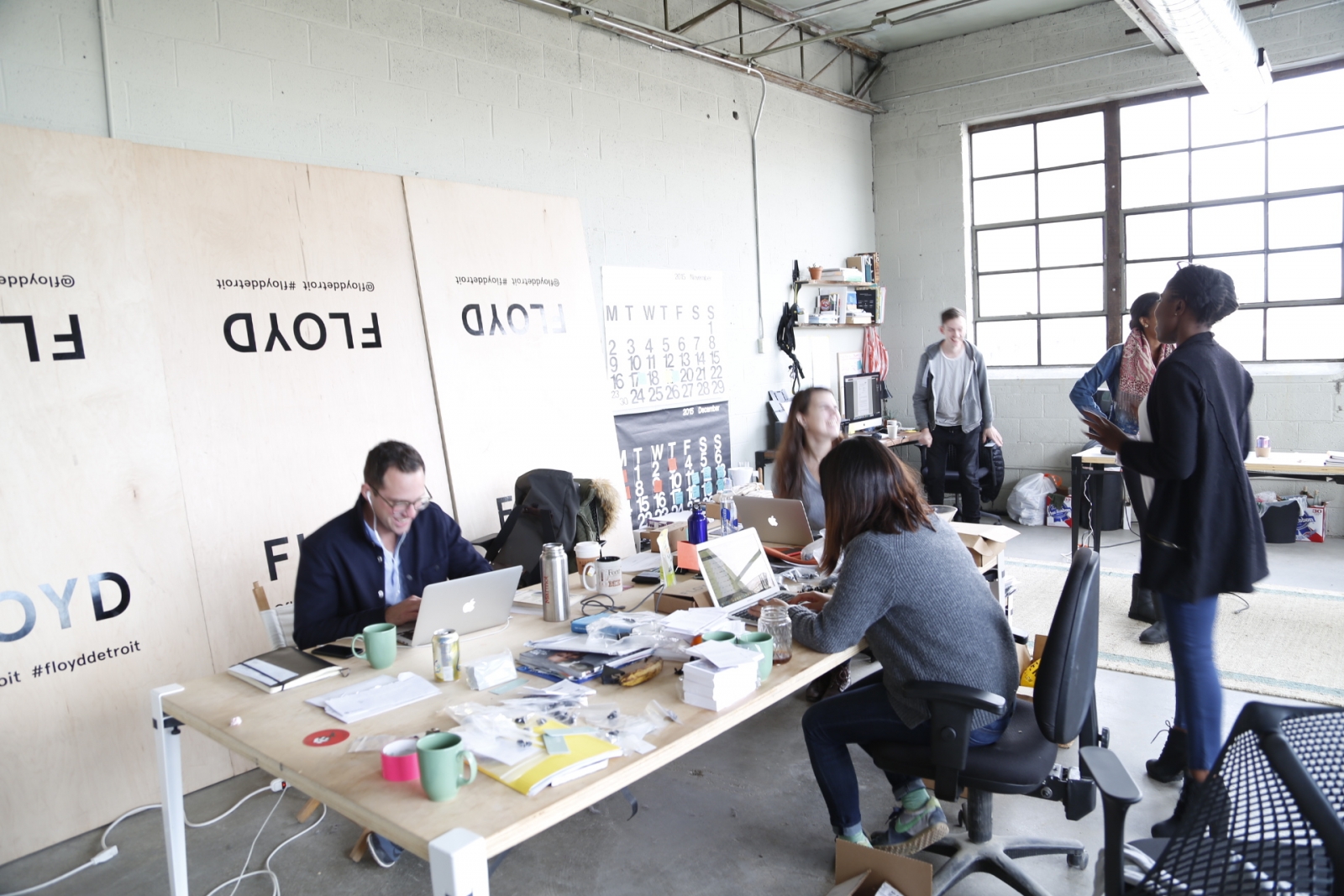
Ponyride is now entering its fifth year, and while some studios, like Floyd, are likely to stay in the coworking area, others are maturing as businesses and moving out, making space for those on Ponyride’s 100-member waiting list.
Veronika Scott is an early Ponyride tenant who came up with the idea for The Empowerment Plan—training formerly homeless women to stitch sleeping bags and coats for people who are still homeless, thus providing employment for the former and a measure of comfort for the latter—as a student at the local College for Creative Studies. She started in 2011 now has 22 seamstresses working with her. “Over the past three years, they’ve made 10,000 coats,” says Cooley proudly. But it isn’t just Scott’s volume that’s impressive; it’s her reach. The Empowerment Plan’s coats go out to the homeless in Detroit, but also to 29 states and three provinces in Canada. She has given more than $40,000 in micro loans and attracted a number of prestigious international partners, like Diane von Furstenberg and American Express, as well as local Detroit businesses. “Carhartt donates the exterior shell; General Motors donates the insulation,” Cooley says.
Connections to investors, collaborators, and established companies are vital to many Ponyriders, who tap into the working space’s impressive network for what they need. Some of these resources are internal—Scott got her initial financing, as well as her first opportunity to publicly present her idea, at an event organized by fellow Ponyrider Detroit Soup. To build more relationships outside Ponyride’s walls, former executive director Karla Henderson “built a board and provided an advisory council,” Cooley says. One of those advisors is the head of zoning for the city of Detroit, so as Detroit Denim’s Yelsma looks for a bigger place for his business, he turns to her for advice. “They can’t zone the new space properly, so she is going to help them work through that process,” Cooley says.
Ponyriders are finding opportunities to grow everywhere. Last year, Schulak’s Culture Lab Detroit paired a number of well-known international designers with makers and artists from the city, and two of those partnerships came out of Ponyride. Line Studio’s Andrew Ward and Detroit Denim both worked with the Italian maestro Paola Navone, collaborating on a line of concrete planters and denim-and-leather overalls, respectively. The results were showcased at a pop-up shop last year, and “we sold everything,” Schulak says. “My mission was that somebody from Ponyride would then go into business with one of these international designers, and I feel very proud because a few of the designers are starting these businesses.”
The question of how to support this next stage of growth for the entrepreneurs is one of many that Ponyride grapples with as it enters its fifth year of existence. Another piece of the puzzle is the educational mission. Part of Ponyride’s DNA is the classes that members teach on its premises or at other city institutions, like the design-build program that Cooley co-teaches at Lawrence Technological University. (“We also had 35 students from a public high school in the neighborhood take that class; they all got college credit,” he says. “We built a sushi restaurant in a park.”) As similar educational initiatives spring up all over the city—Ponyrider Gabriel Craig of Smith Shop (featured in Metropolis’s “The Best New American Makers” last March) is set to launch the Center for Craft & Applied Arts, for example—Ponyride needs to build a network around that as well.
And as members move out (like Detroit Denim), expand (like The Empowerment Plan, which wants to add 20 seamstresses this year), or build other institutions (like Smith Shop), there is also the challenge of the waiting list. Because Ponyride does such an excellent job of supporting its members, “we currently have a waiting list of more than a hundred people,” Safari says. On her long to-do list is preparing the next cohort of Ponyriders, who will need to subscribe to the space’s fundamental urban and social mission: “We are in a unique position to tap into local talent, create a pipeline for it, and provide an educational opportunity,” she says. “We have to make sure we are lowering the barrier for maker–entrepreneurs, because we are trying to encourage a holistic approach to product manufacturing in Detroit.”
The biggest challenge for Ponyride, however, might be this: Amid the boosterism and pressure to show evidence of spectacular growth, both internally and citywide, it will have to fiercely guard the space so that it is safe for businesses to fall apart, or for people to try ideas that don’t work.
“Part of why Detroit failed so miserably is how risk-averse this community can be,” Cooley says. “We’re hoping to create a space where people can try, fail, and realize something.” Although Ponyride’s name came from a pretty chaotic brainstorming process, it stuck precisely because it captured some of this attitude. “If you fall off a pony, it’s a short fall. You get back up and try again,” Cooley explains. “That’s why, when you’re a kid, everyone loves a pony ride. You should see all the youth tours we get: ‘Aww, there’s no pony here?!’”

Designer Chris “Critty” Morris tapped into a need for hip-hop and streetwear with The Dirt Label in 2006. The company specializes in limited-edition clothing and accessories for both men and women.
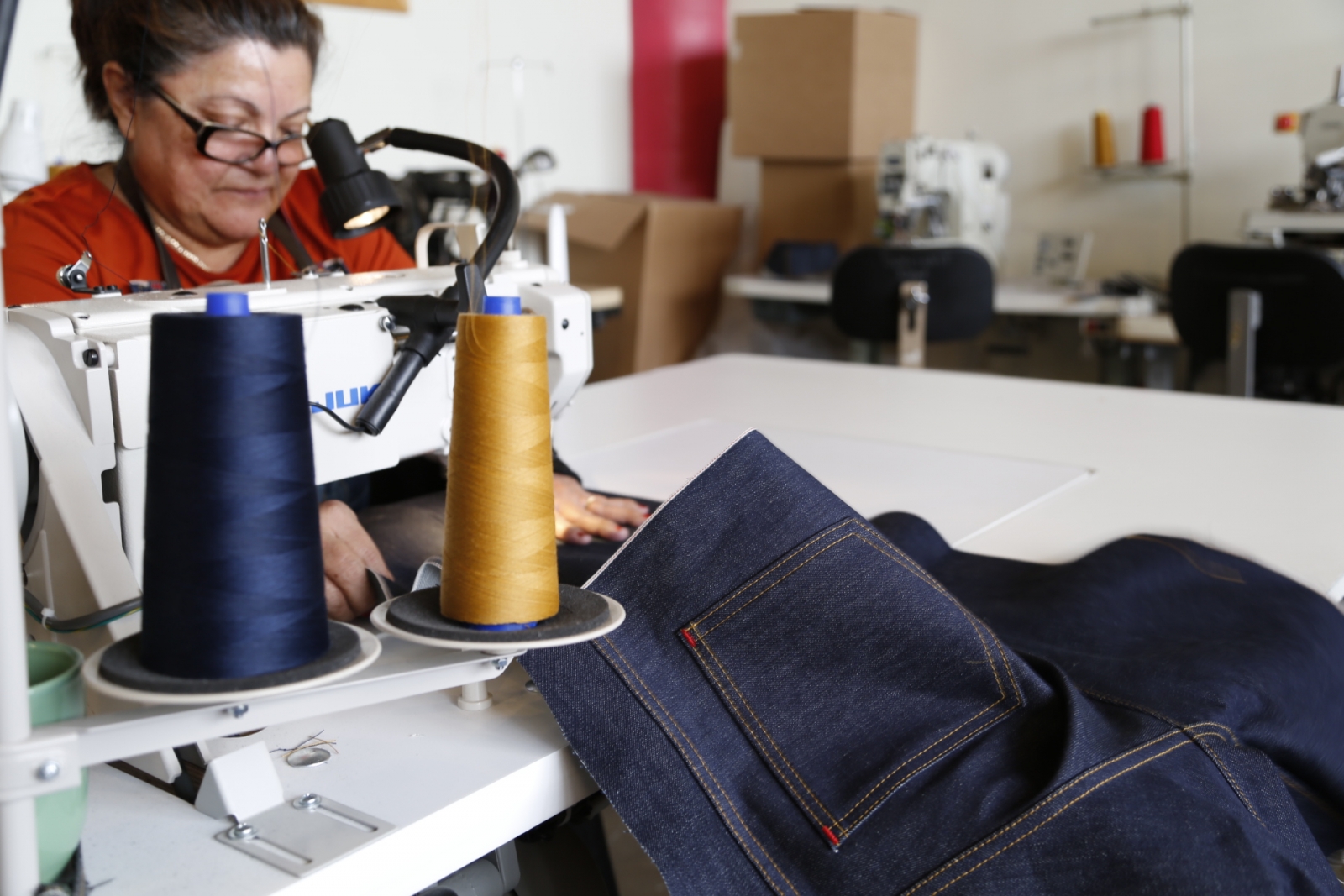
A seamstress puts a pair of jeans through one of the 85 production stages at Detroit Denim Co. The selvedge denim is sourced from Cone Mills in North Carolina and is never distressed before being sold.

Anthology Coffee, founded by Josh Longsdorf, now has its own grinder and state-of-the-art espresso equipment from Modbar, but “they started from just drip coffee,” Phil Cooley remembers.
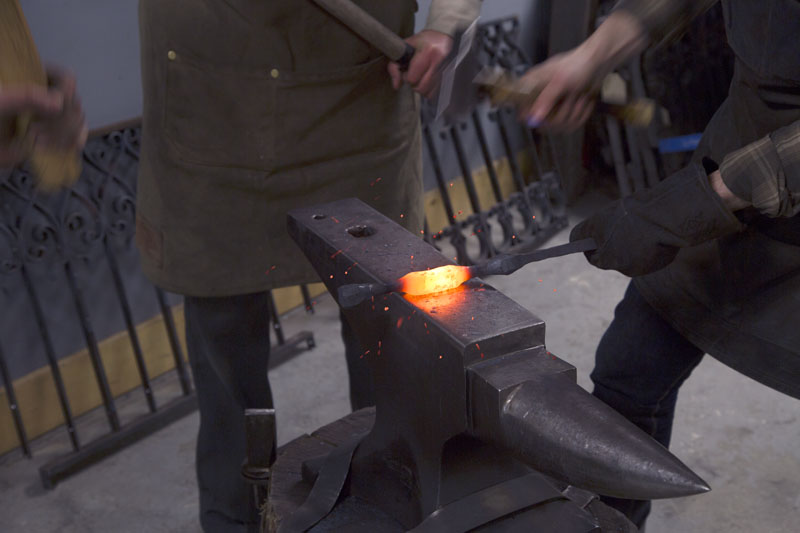
Smith Shop, the metalworking studio founded by Gabriel Craig and Amy Weiks is on the ground floor of Ponyride. Craig will also be teaching blacksmithing at the soon-to-open Center for Craft & Applied Arts in Detroit.
